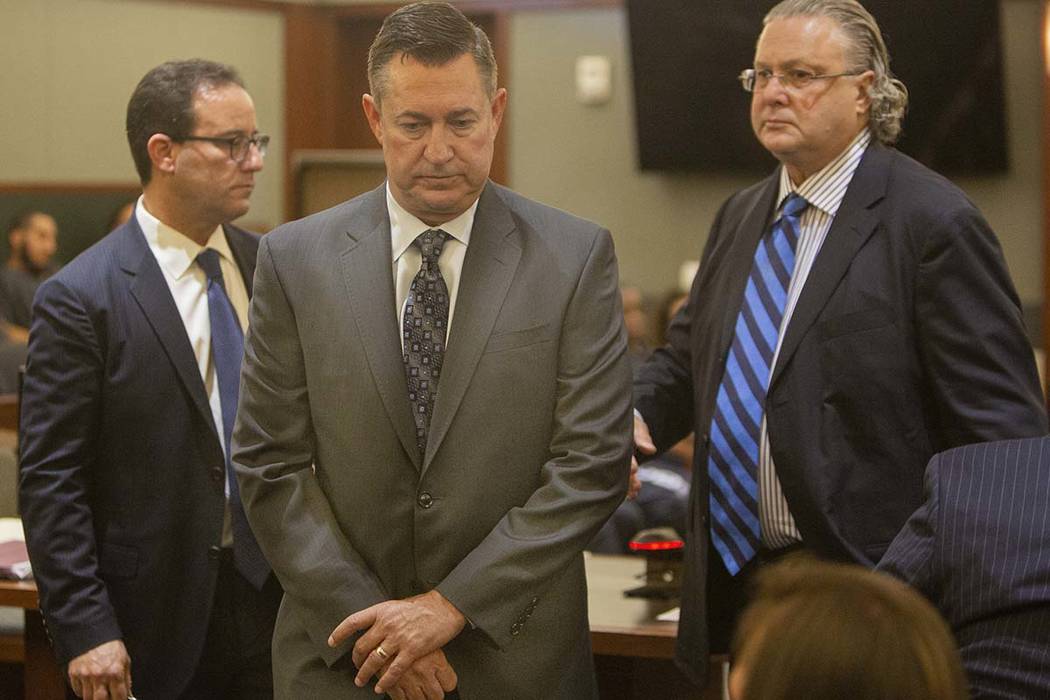Lawyers seek dismissal of Scott Gragson’s charges in fatal DUI crash
Attorneys for real estate broker Scott Gragson filed a petition Monday to have his DUI indictment thrown out on claims that inadmissible evidence was presented to the grand jury.
The indictment stems from a fatal high-speed rollover crash in May at The Ridges, an upscale Summerlin community where his grandfather, former Mayor Oran Gragson, owns a home.
Gragson, 53, faces one count of DUI resulting in death, three counts of DUI resulting in substantial bodily harm and four counts of reckless driving. He has pleaded not guilty.
The petition claims that not only did prosecutors present improper evidence to the grand jury, they failed to present exculpatory evidence provided by Gragson’s legal team.
It draws attention to former Metropolitan Police Department traffic Capt. Nick Farese, who was relieved of duty without explanation the day after the crash. Gragson’s attorney asked that Farese’s disciplinary record with Metro be presented to the grand jury, yet no evidence or testimony relating to Farese was presented, according to the petition.
The petition, prepared by attorneys David Chesnoff and Richard Schonfeld, also claims there were numerous issues with the blood draws done at University Medical Center to check Gragson’s blood alcohol content.
Gragson’s blood was not drawn until more than three hours after the crash, violating a “two-hour rule” to draw blood after a DUI crash, even though a warrant was obtained after two hours had passed.
Under Nevada law, blood evidence drawn more than two hours after a DUI crash is not admissible in court, and the petition claims that there was no probable cause to perform a blood draw in the first place, nor to make an arrest based on the results.
Gragson’s arrest report states that the first blood draw three hours after the crash measured his blood alcohol content at 0.147 percent, nearly twice the legal limit for drivers in Nevada.
In addition, University Medical Center staff testified that Gragson’s skin was swabbed with alcohol to prepare for two separate blood draws. According to the petition, iodine, not alcohol, must be used for DUI blood draws to avoid the possibility of tainting evidence.
The petition further claims that state prosecutors violated privacy laws by procuring information on Gragson’s treatment after the crash from the hospital. It claims doctor-patient privilege was violated when prosecutors allowed a University Medical Center nurse to testify about his demeanor at the hospital.
All of that evidence and testimony, the petition claims, is inadmissible.
Body camera footage from the moments following the crash shows Gragson taking a field sobriety test and telling police that he’d had several alcoholic drinks before getting behind the wheel.
According to the petition, Gragson had not been read his Miranda rights before he made those statements to police, meaning that those statements, like the blood evidence, could not be used as probable cause for a DUI arrest.
Gragson’s criminal trial is set for March.
Three lawsuits have been filed against Gragson by survivors and by the family of Melissa Newton, who was killed in the crash. The suits all claim that the occupants were not aware of how much Gragson had been drinking.
Contact Max Michor at mmichor@reviewjournal.com or 702-383-0365. Follow @MaxMichor on Twitter.


















